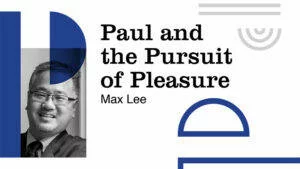 Nobody thinks that the ultimate consummation of the Kingdom God will be a place where rogue viruses kill hundreds of thousands of people, or hurricanes ravage whole communities, or cancer cuts lives short. So we Christians believe it is possible for there to be that kind of place. But was creation originally a place that was also free from such “natural evils,” which fell into its current state when humans first sinned?
Nobody thinks that the ultimate consummation of the Kingdom God will be a place where rogue viruses kill hundreds of thousands of people, or hurricanes ravage whole communities, or cancer cuts lives short. So we Christians believe it is possible for there to be that kind of place. But was creation originally a place that was also free from such “natural evils,” which fell into its current state when humans first sinned?
The Right Name for Natural Evils
Insofar as this is a scientific question, the answer is clear: viruses, hurricanes, and cancer predate humanity by a very long time. But there are several terms in the question that are not scientific terms: creation, evils, fell, sinned. These are inescapably theological and ethical categories, and I am unwilling to cede that territory to the sciences. So science doesn’t get to answer this question on its own.
Instead, there needs to be a dialogue between the relevant disciplines, in which we learn from practitioners in each field, and we humbly work together to come to conclusions. That cannot be accomplished in a short essay, but I’ll attempt to point toward how such a dialogue might grapple with the question of whether “natural evils” were included in God’s good creation.
Conceptual Clarification
I begin my mini-dialogue amongst disciplines with the kind of conceptual clarification that is typical of philosophy. I’ve been putting “natural evils” in scare quotes for a reason. I think calling viruses and the like “evil” strains our normal usage of the term. Let’s start with a story.
When my son Casey was in elementary school, the neighbor’s dog strayed out of its yard into ours and bit Casey on the leg. We had to check for rabies and involve the authorities to take measures to prevent this from happening again. And we even said “that’s a bad dog.” But I don’t think it would conform to strict standards of usage to say, “that’s an evil dog.” Our word “evil” carries with it the connotation of moral responsibility, and I don’t think a dog has genuine moral responsibility for its actions. So even when it bites a child, it is not appropriately called “evil.”
But think if the same action had been done by my neighbor! If he had strayed out of his yard and bit Casey on the leg, there would have been different authorities involved and we wouldn’t have merely said, “Bad neighbor!” Assuming he wasn’t deranged or had other excusing factors, we’d say that was a morally reprehensible thing to do. He would be responsible for Casey’s pain and suffering, and we could rightly say, “that was an evil thing to do.” The “natural evil” of the dog bite seems to belong to a different category than this moral evil.
Where does the coronavirus fit in this scheme? It is responsible in the causal sense for the deaths of hundreds of thousands of people, and we should take what measures we can to prevent it from causing even more death and suffering. But it is not a moral agent and so not morally responsible. It is not evil the way we judge Hitler or Pol Pot to be for causing large-scale human suffering and death. The virus is like the neighbor’s dog in this respect. It is part of the natural world that just does what it does, without planning or forethought, and without moral responsibility for its effects on the world.
Of course, sometimes non-moral things can be used by moral agents for evil. If I set a house on fire and kill its occupants, it is the fire that directly causes the deaths, but I’m morally responsible—not the fire itself—even if I didn’t specifically intend the scale of suffering that ensued (our justice system recognizes degrees of moral responsibility in such cases). But what if the fire started because of a lightning strike? We’re back to the dog, rather than my neighbor, biting Casey; the effects might be the same, but there seems to be a big difference between our evaluation of “evils” for which some moral agent is responsible, versus those which happen naturally.
Unless . . . there really is a moral agent responsible for what we’ve called natural evils. Because this can’t be the way the natural world—God’s good creation—really is, can it?! Something must have happened, and someone must be responsible.
Theology and Scripture
Here the theologians pipe up: we have long appealed to the fall as something that could explain the natural evils we observe today. “Fall” isn’t in the Bible, but many theologians have thought the Apostle Paul’s reading of Genesis 3 could be interpreted as supporting a fall which brought about natural evils. The first humans sinned and “lit the fire” that still burns in hurricanes and viruses and biting dogs.
In essence, this approach collapses the distinction between natural and moral evils; they’re all moral evils and human sin is to blame. Is this view still tenable?
Again, science doesn’t get to answer theological questions, but it can certainly prompt us to reconsider whether we’ve done our theology well. And because in this case,Again, science doesn’t get to answer theological questions, but it can certainly prompt us to reconsider whether we’ve done our theology well. there is overwhelming evidence that these “evils” were causing suffering and death long before humans were around to sin, this should prompt us to look again at whether Scripture can be faithfully interpreted in ways other than blaming human agents for the effects of natural evils.
Whether you take “Adam” as a proper name of an individual or as the designation of an archetype in Genesis 2 and 3, it is significant that he was placed in the garden and told to “keep” it (2:15). The same Hebrew word translated “keep” (shamar) is used in Gen 3:24, when the cherubim are posted at the east end of Eden to “guard” (shamar) the way to the tree of life. If Adam was told to shamar the garden (prior to any sin), it’s reasonable to suppose that there were conditions outside the garden that needed to be “kept” at bay in order to preserve the conditions in the garden. And we might even read this in conjunction with the charge to humans in Genesis 1 to “fill and subdue” the earth, and so see humanity as commissioned to extend the conditions of the garden to the rest of the world (which, by the way, God evidently created with the need to be subdued). But humanity/Adam failed in this commission; humanity fell and our sin has made things worse. That doesn’t have to mean, however, that the natural world also fell from the way it was created. Yes, God cursed the ground in Genesis 3, but then five chapters later in the Noah story, God promises never again to curse the ground. So it seems legitimate to read Genesis as portraying a creation that was good, even though it needed subduing by the image bearers God appointed.
OK, but what about Romans 8? The groaning of creation, and its being subjected to futility? Paul says, “We know that the whole creation has been groaning in labor pains until now” (8:22).
The metaphor of labor pains suggests that creation is in a gestational period, that it is not yet born into what it is ultimately intended to be.
The metaphor of labor pains suggests that creation is in a gestational period, that it is not yet born into what it is ultimately intended to be. When will that happen? Back up three verses: “For the creation waits with eager longing for the revealing of the children of God” (8:19). When we children of God finally live up to the calling we were originally given, then creation too will become what it was ultimately intended to be. Because we didn’t do that originally, and introduced sin into the world instead, we need the atoning work of Christ to make things right. And although that has already happened, we await the further action of God to consummate the Kingdom of God in the new heavens and new earth when we become the bride of Christ. And that’s when there will be no more “natural evils.”
So why didn’t God just make it that way to begin with? The Romans passage might offer a clue. The Greek of verses 20–21 is a bit ambiguous, but the NRSV translates it as: “the creation was subjected to futility, not of its own will but by the will of the one who subjected it, in hope that the creation itself will be set free from its bondage to decay.”
Creation was subjected to futility not as a punishment, but “in the hope that it would be set free.” There seems to be some purpose God had in mind for subjecting creation to futility, and it seems connected to our role as the children of God, as God’s image bearers. God created a place that needed to be subdued, a place where his image bearers would have a job to do. We are supposed to have an influence on creation, to cooperate with God in setting it free.
But then, subjecting creation to futility (which includes, on this reading, allowing natural evils) may have had a purpose for our own development too. Just as the created order itself was not created the way it was ultimately intended to be in one fell swoop, perhaps we can let that theological insight affect our interpretation of the scientific details we’ve uncovered about the natural history of Homo sapiens.
Theologically Informed Science
Evolution is too often presented as entirely about competition, struggle, and survival of the fittest. Increasingly what we’re finding, though, is that often the fittest organismsEvolution is too often presented as entirely about competition, struggle, and survival of the fittest. are the ones that have learned to cooperate with others rather than dominate them. Scientists are skittish about seeing teleology in the scientific details of the progression of forms, but as Christians who allow theology to bear on our understanding of science, we might see something more than the bare facts.
The development of life on Earth has progressed from simple prokaryotic cells to complex eukaryotes; from asexual reproduction to sexual reproduction; from single cells to multicellular organisms; from solitary individuals to colonies that work together; and from primate societies to human cultures. In each of these stages, challenges and difficulties were overcome through innovations. We can look at the history of life through theological eyes and see the building blocks of capacities needed to bear the image of God—cooperation, moral responsibility, love.
Couldn’t God have made us what he wanted us to be without going through the difficulties and “futility” the natural world was subjected to? That doesn’t appear to be God’s style. God seems content to bring about his intentions for the world through suffering and death, and to call this good—even though it is also God’s ultimate intention to defeat death one day. This is the paradox of the cruciform nature of creation. But it also fits with Paul’s words back in Romans 8: “We are children of God, and if children, then heirs, heirs of God and joint heirs with Christ—if, in fact, we suffer with him so that we may also be glorified with him” (8:16–17, emphasis added).
I’m not saying Paul knew about the long ages of suffering and death that predated humanity, nor that the Holy Spirit inspired Paul (without his knowledge) to hint at evolution in his letter to the Romans. I’m just saying that this interpretation of Scripture and this theological explanation are consistent with the picture science has revealed of the long evolutionary ages in which there were challenges presented by “natural evils” that could bring about some harm.
Is the Coronavirus Evil?
There is much more to be said here—again, I’m only pointing toward the dialogue that needs to happen. But I can’t bring myself to believe that “natural evils” like the coronavirus really are evils of the sort started by a morally responsible agent. Of course there is no doubt that they are hard and can be seen as elements of “futility” we can’t quite explain to everyone’s satisfaction. But turning to another New Testament author, we might see the trials brought about by these natural evils as opportunities. Let’s “consider them pure joy,” and see them as opportunities for us to respond in ways that “produce endurance,” and then ultimately used to make us “mature and complete” (Jas 1:2–4).
In that sense, the current suffering from the coronavirus might be another opportunity for us to become more like the people God intended us to be: to understand better the way this little part of the world works, to leverage that knowledge in ways that protect especially “the least of these.” To collaborate with God in bringing good out of this and all situations we find ourselves in (Rom 8:28).
I may not like it, but I can’t call such an opportunity evil.







Comments
Be the first one to make a comment!